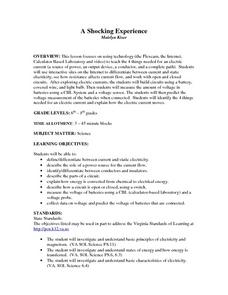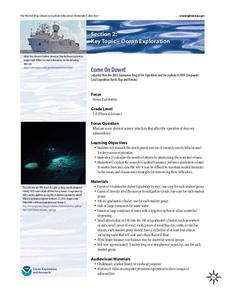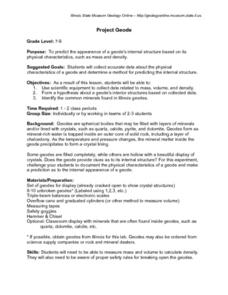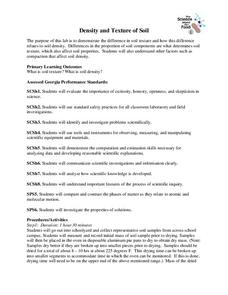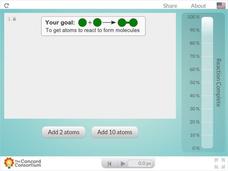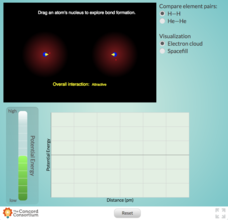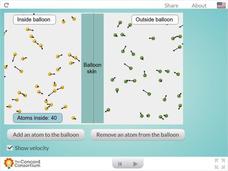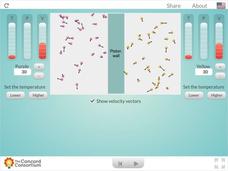Curated OER
Designing a Real Life Ecosystem!
Students research abiotic and biotic factors concerning the concept of an ecosystem. Record and analyze data collected. Write a lab report in proper and scientific format with thinking and analytical skills. Work as a cooperative team.
Exploratorium
Laser Jello
The concepts of refraction and reflection gel with your physical science class during this colorful exploration. Shining lasers through Petri-dish-shaped gelatin desserts, they will notice how the light travels and bounces off the sides....
Center Science Education
Looking Into Surface Albedo
How does the color of a surface affect the heating of the earth? Middle school science classes experiment with color and surface albedo to determine the relationship. The website has tabs for an overview, teacher's instructions,...
Curated OER
A Shocking Experience
Learners differentiate between current and static electricity, conductors and insulators, explain how energy is converted from chemical to electrical, measure voltage of batteries, collect data on voltage, and predict voltage of...
Curated OER
Solar Kit Lesson #9 - Properties of Solar Radiation: Reflection, Transmission, and Absorption
Middle school science stars observe and record data on the solar radiation reflected off or transmitted through various materials. They predict properties for various materials, and test their predictions by touch. This lesson becomes...
NOAA
Come on Down!
What do we do when a dive is too dangerous for humans to accomplish? Send in the robots! Middle school scientists get acquainted with several different models of submersible robots in the second lesson plan of six from NOAA. Lab groups...
NOAA
Watch the Screen!
Can a sponge cure cancer? Life science pupils visit the drugstore under the sea in the fifth lesson of six. Working groups research the topic then get hands-on experience by testing the inhibiting effects of several plant extracts...
Curated OER
Project Geode
Young geologists attempt to predict the appearnace of a geode's internal structure based on how it looks from the outside, its mass, and its physical characteristics. In this geologly lesson, learners use scientific equipment to collect...
Curated OER
Fossil Fuels (Part III), The Geology of Coal
Do not overlook this set of lessons just because your school does not have a data analysis system. There is plenty of material here to administer a complete mini unit on the formation, distribution, and properties of coal. Since it...
Columbus City Schools
Changes All Around Us
Whoa! What just happened? That's right, change is everywhere. But what exactly is changing? Middle school science sleuths get to the bottom of the changes matter can experience. Through simple demonstrations, engaging videos, and an...
Teach Engineering
Nanotechnology and Cancer Treatments
Information on the biomedical use of nanotechnology, specifically in the detection and treatment of cancer, is the focus of a lesson that seems like it is out of a science fiction novel. Pupils learn about electrophoresis, which is used...
Learning Games Lab
Controlling Water Activity in Food
Food storage matters! Scholars learn how the amount of water in corn can affect its rate of spoilage. They create a control group, then test three corn samples stored in three different locations for water activity. As a result of the...
Curated OER
How do Hypotonic, Hypertonic, and Isotonic Solutions Affect the Water Movement of a Cell?
After removing the shell from a raw egg, cell biologists soak the egg in either a hypotonic, hypertonic, or isotonic corn syrup solution. They calculate the percent change in mass and compare it to the strength of the solution in a...
NASA
Ripening of Fruits and Vegetables
How long do fresh foods last in space at the International Space Station? Which foods perish quicker than others? How can astronauts preserve their foods to make them last longer in space? Young scientists test the rates at which...
Curated OER
Heterogeneous Equilibrium: Measurement of a Partition Coefficient
In this chemistry worksheet, students examine a concept in science and then use the knowledge in application by conducting an experiment.
University of Georgia
Density and Texture of Soil
All soil is not created equal! A lab activity asks learners to collect and analyze soil. Specific calculations determine the amount of sand, silt, and clay in a sample and allow individuals to identify the soil texture.
Virginia Department of Education
Aspirin Analysis
Laughter may be the best medicine, but aspirin is also important. Young chemists analyze aspirin tablets using titration in this lab experiment. They then repeat the entire experiment using a different aspirin brand.
Teach Engineering
Water Remediation Lab
Water filtration — that's pure genius! Groups test the ability of a water filter to purify water by running chlorine contaminated water through a filter and measuring the chlorine concentrations as they filter the water. They then graph...
Concord Consortium
Sticking a Balloon to a Wall
This is one sticky situation! Science sleuths uncover the mystery behind a balloon that appears to be stuck to a wall using an interactive. Learners observe a neutrally charged wall before they manipulate the charge on a balloon. Atom...
Concord Consortium
Concentration and Reaction Rate
Does concentration affect the rate of a chemical reaction? Science scholars observe and control a chemical reaction in an interactive simulation. The resource allows pupils to add atoms to the reaction vessel and monitor the reaction's...
Concord Consortium
Exploring Hydrophobic Core
How do the hydrophobic and hydrophilic regions of a protein affect its shape? Science scholars explore the molecular properties of protein molecules using a detailed interactive. The resource allows the user to rotate the protein, view...
Concord Consortium
Non-Bonding
What makes helium so Noble, anyway? Explore the bonding properties of helium versus those of hydrogen using an interactive resource. Science scholars manipulate atoms of each element and observe changes in potential energy as the atoms...
Concord Consortium
What Is Pressure?
Balloons bring great fun to the classroom, until they break. What's a teacher to do then? Break out the balloon of the computer age with a fun interactive! Science scholars add and remove atoms from their virtual balloons and observe...
Concord Consortium
Pressure Equilibrium
All together now! Physical science pupils observe the effects of temperature and amount of substance on pressure and volume of a gas. The interactive resource guides learners through the Combined Gas Law, where they observe changing...
Other popular searches
- Science Lab Safety Rules
- Science Lab Safety
- Environment Science Labs
- Physical Science Lab Safety
- Forensic Science Lab
- Teaching Science Lab Safety
- Science Lab Equipment
- Science Lab Report
- Simple Science Lab Report
- Science Lab Safety Symbols
- Physical Science Labs
- Science Lab Report Templates



